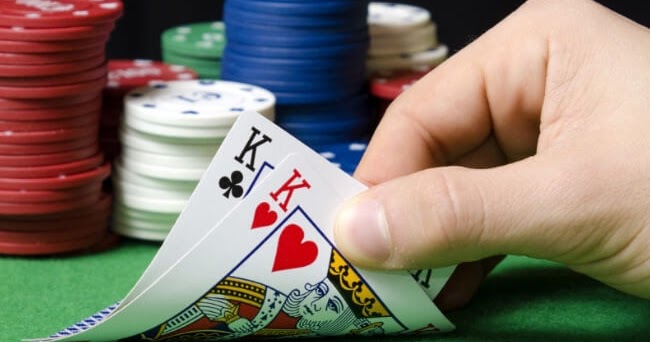Fold Poker Term
Folding means discarding one’s cards, thus ending his/her action in a given hand. “I had 72 offsuit in early position so I folded.” Verbally announcing “fold” when the action is on you is a binding action at the poker table. The action then proceeds around the table and other players have the chance to call, raise, or fold. If everyone folds and the big blind checks, then there are just you two in the pot, plus the $5 from the small blind, who folded. A loosely-defined term that entered the poker lexicon from short-stacked tournament play. In that context 'having fold equity' means having enough chips to compel an opponent (typically the big blind) to fold if you shove. Also used informally to describe the added EV we gain by taking an aggressive action, thereby causing our opponent to fold.
To limp in poker is to bet the absolute minimum needed to stay in a hand. Limping is often used when the little blind simply calls the big blind instead of raising. It's also known as limp in, flat call, or calling the blind.

Poker Term Fold Equity
An open limp is when the first player to enter the pot preflop bets only the amount of the big blind, the minimum bet. The under the gun position is one that is most likely to open limp to see how the rest of the table will be playing their hands.
Limping is considered to be weak and passive play and is seen more among beginning poker players rather than experienced players, who prefer to open with a raise if they have a hand they wish to play.
Small Blind Limp
An example of the small blind limp is being dealt 8-9 offsuit in the small blind. All of the players before you fold so only the big blind and you will be in the hand if you limp in. You place the minimum bet in hopes that the big blind will simply check and you'll be able to see a cheap flop.
By limping in from the small blind, you risk that the big blind will raise and you'll have to decide whether to match it to see the flop. However, it is a cheap investment as you've already had to bet half of the amount of the big blind if you had folded rather than limped in.
If you have a strong starting hand when in the small blind, limping would be a weak or passive move. But if the big blind raises, you have the choice of reraising and sweetening the pot. However, that also signals that you have a strong hand, perhaps A-A.
A small blind limp with a strong hand can be a tactic to use against an aggressive player in the big blind. You can anticipate that they will raise and then you have the opportunity to call them and see the flop or to re-raise.
Open Limp
An example of an open limp is that you are the player under the gun and have the first action preflop. The big blind minimum bet is $10, so you place that bet. The action then proceeds around the table and other players have the chance to call, raise, or fold. If everyone folds and the big blind checks, then there are just you two in the pot, plus the $5 from the small blind, who folded.
More often, in the above scenario, one of the other players will raise the bet. You then have the choice to fold, call, or reraise. If you aren't prepared to defend your hand and call the raise, you have wasted chips by limping in.
Fold Poker Meaning
From any position, limping in is considered to be a beginner's move and weak or passive play. But you might use it as a tactic if you are prepared to call any raise.
PLAYER ACTIONS
Bet: Making the first wager.

Call: Paying the amount of a previous bet tostay in the hand.
Check: If no one has bet or raised before,passing the action onto the next player without making a wager withthe option to call or raise later.
-01.jpg)
Fold Termine Poker
Raise: Making a second wager (doubling it)after one player has bet.
Re-raise: Making a third wager after one playerhas bet and another has raised.
Check Raise: To check and then raise after aplayer behind you bets. This poker tactic is useful in narrowingthe field of players.
Fold: Getting out of the hand (before or afterinvesting money).
MORE BASICS
Ante: Small bet each player makes at thebeginning of every hand - pay to play - that ensures a minimum potto seed the action before any cards are dealt.
Pot: The amount of money after antes, bets,raises and re-raises that a player wins when the hand isfinished.
Dealer: The player or professional who isdistributing the cards.
Muck: To fold - muck your hand. Also, the pileof dead - burned and/or folded cards not in play - in front of thedealer is called the muck.
Bluff: Betting or raising to appear strong withthe intention of forcing players out of the game when holding a badhand that has little chance to win.
Draw: Play a hand that could be good if theright cards come.